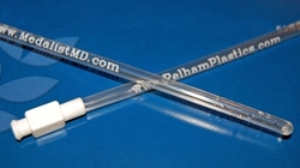At MD&M West 2012 conference, Teknor Apex has announced that two medical device manufacturers, Pelham Plastics and Dunn Industries, have shown the precision and simplicity of working with tubing made from Medalist MD-500 Series of medical elastomers. The demonstration represents the Medalist compounds as viable alternative to PVC.
 Assembled tubing made from Medalist medical elastomer shows results of post-extrusion processes, including hole punching, tipping, printing, and insert molding.
Assembled tubing made from Medalist medical elastomer shows results of post-extrusion processes, including hole punching, tipping, printing, and insert molding.
The compounds have revealed exceptional performance, when used by the medical device companies in production runs, including insert molding, printing, tipping and hole punching. Medical tubing specialist, Dunn Industries has extruded Medalist elastomers at its facility in Manchester, New Hampshire. The tubing made from these elastomers has been easily cut with extrusion. Pelham Plastics, a pioneer in custom injection molding of medical devices, has performed various downstream assembly techniques using tubing made from MD-500 Series compounds. The company demonstrated that the tubing’s fabrication performance has been exceptional. In addition, Pelham Plastics experienced ease in working with the tubing that included tipping, hole-punching and printing.
Senior medical market manager for Teknor Apex’s Thermoplastic Elastomer Division, Elliott Pritikin, noted that the current successes have followed two recent advancements: Teknor Apex has developed patent-pending technologies to connect Medalist elastomer-based tubing with traditional connectors and demonstration runs conducted by American Kuhne shows that the MD-500 Series materials can be produced in high-speed tubing lines.
Medalist MD-500 Series medical elastomers are highly flexible and have mechanical properties and crystal clarity comparable with PVC. They offer resistance to necking and kinking and clamp resilience. Medalist compound is considerably less dense when compared to PVC. In addition, it experiences minimal heat-aged color shift once exposed to gamma irradiation, which is the most severe form of sterilization.